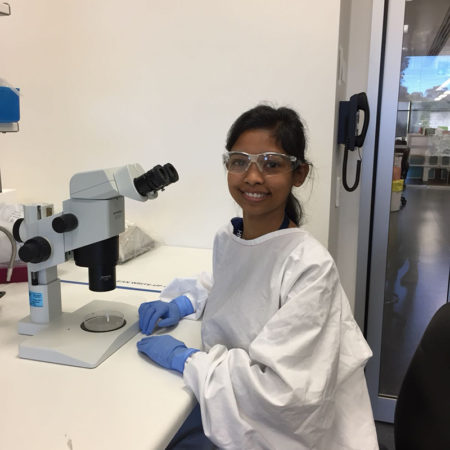What are some of the key findings, progress and discoveries you have made with your research to date – and how will this make a difference to patients with this disease?
We have previously developed the first short-term cigarette smoke/carcinogen-induced mouse model of lung cancer that evolves and progresses in a reasonable timeframe. This model directly recapitulates hallmark features of LAC and we are currently undertaking further whole genome sequencing (WGS) on this model to assess genomic changes linked to the development and progression of LAC.
We are now developing a new mouse model of SSC induced by exposure to the carcinogen, N-nitroso-tris-chloroethylurea (NTCU) and cigarette smoke (CS) as we have recently completed for our LAC model. NTCU is a potent chemical carcinogen which induces SCC in mouse models. It is highly specific for lung and induces SCC when applied topically. The current concept of the development of SCC is that exposure to CS and NTCU causes somatic and genomic mutations that drive the transition from normal tissue to invasive cancer. Extensive epidemiologic data from previous studies shows that CS is a risk factor for the development of SCC. Recent studies on the genomic landscape of SCC have identified some mutations that correlate with CS exposure. Identifying prognostic, predictive biomarkers and genetic alterations will reveal underlying targets and this will facilitate the development of early detection tests and new treatments for SCC.
What do you hope to achieve with this research project?
Lung cancer is the leading cause of cancer-related death. There are currently no effective diagnostic approaches for early detection that would enable more effective treatment. There are numerous issues with the utility and cost of computed tomography (CT) screening for diagnosis. Thus, the inability to predict lung cancer risk in people with a smoking history is a major clinical and public health problem. This project is the first that aims for early detection based on genomic alterations that take place in the early phase of SCC development, and will allow us to compare these findings with our established model of LAC to identify specific and diagnostic mutation changes. This project also involves investigating the underlying mechanisms in the initiation and progression of lung SCC. We will use our novel mouse models to identify genomic alterations early in the development of SCC, which we will validate in human samples. Our results have the potential to identify predictive mutations and changes that will pave the way for large clinical screening trials and the development of new early lung cancer diagnostics using samples collected using minimally invasive methods (ie in sputum and blood).
How important was the funding from Lung Foundation Australia to your work?
Research funding for lung diseases including lung cancers is less than other diseases of equivalent or lesser importance in Australia and globally. Notably, Lung foundation Australia has been pivotal in supporting research in various capacities for last 20 years. Lung Cancer research is the main focus of my PhD studies and without lung foundation Australia fellowship and grants, this wouldn’t be possible. The generous support from the foundation has helped me elevating my research focus to ensure lung cancer research remains a priority. I intend to develop a representative mouse model of cigarette smoke/NTCU-induced SCC to investigate the initiation and development of tumours that would aid in identification of key genetic markers, potentially revealing novel therapeutic targets. My study would eventually help finding the prognostic and preventive biomarkers sooner and also improve the early detection and curative treatment of Lung Cancer.
Do you have a message for Lung Foundation Australia’s supporters?
There are few many answers to the questions raised by Lung Cancer patients. By supporting the LFA which is supporting us and others in our research you are helping us find those answers. This research would lead to new hope and benefits for those who are living with lung cancer. Your continuous support would change the lives of many Australian’s who are living with a lung disease like cancer. We are very hopeful that we will be able to develop new diagnostics and conquer and control this disease soon.
Was this page helpful?
Good job! Please give your positive feedback
How could we improve this post? Please Help us.
